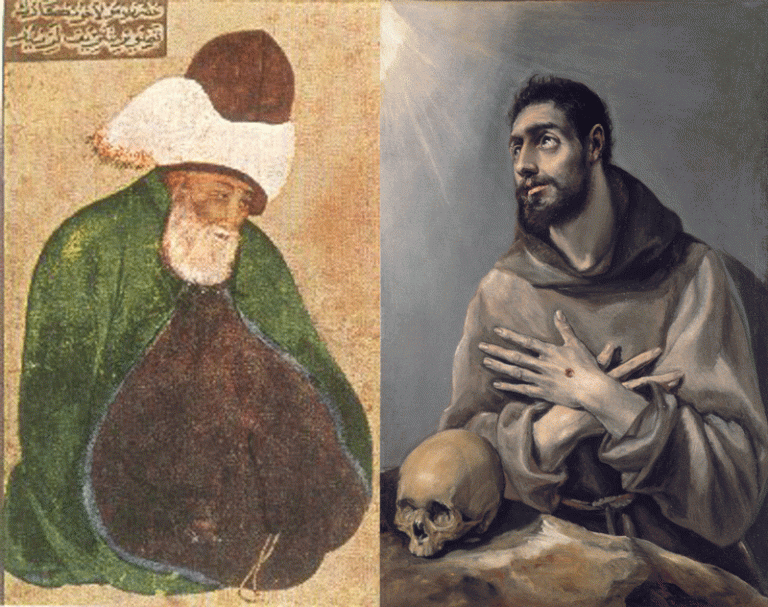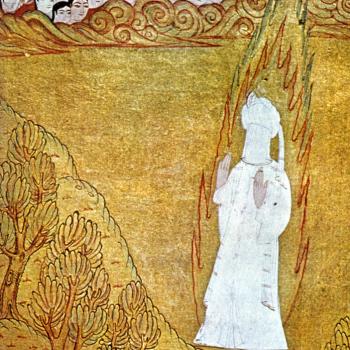
The word “saint” seems to have accumulated some negative associations in the West. When we describe someone as a “saint” we don’t always intend a compliment. We can mean someone with a cloying niceness, or a holier-than-thou religiosity. A saint isn’t someone we would want to spend any time with.
We’re cynical today and more than a little egotistical. We like to think we appreciate someone who has a bit of the devil in them, a bit of edge, like us. The saint is a damp squib. If we probed this, we might find that this attitude is not just the result of a superficial understanding of spirituality, it may also be our ego’s means of protecting itself. Genuine sainthood threatens us; it’s good to make it into a caricature we can look down at.
Perhaps it’s not entirely our fault. We can blame religious authorities who have foisted “saints” on us in the past for self-serving reasons. We have a right to be suspicious of their authenticity. We have a right to want to run the other way when someone starts yakking about saints.
And to speak of Muslim saints brings an added complication because, in the West, we have been used to primarily thinking of Christian saints, which suggests celibacy and monasticism. These are valid spiritual practices, but they are misleading when speaking of Muslim saints, most of whom mixed with society at large, earned a livelihood, married, raised families, etc.
But where did this word come from, and what does it really mean? After a little research, I discover that it shares the same root as the word “sacred” and ultimately stems from the Proto-Indo-European root sak. It’s therefore as old as any word can be, and it carries the idea of being consecrated or dedicated. This raises the question of to what? Whereas most of us are directionless, or torn between a thousand different directions, the saint is someone whose whole being points towards something. This is what Rumi is, what St Francis is. And though these living signs look different, they are pointing in the same direction. As for what lies in that direction: it would be tempting to simply say “God”. But perhaps it is more fruitful to say “our humanity”.
Contrary to the caricatures we may have imbibed depending on our cultural background, the saint is not an insipid or repressed figure, nor a socially dysfunctional layabout lacking certain human qualities. On the contrary, the saints exist to make us more human. In Islam, the saint is the insan al-kamil, the completed human being, someone who displays the full spectrum of human potential and who directs us to a fuller, more authentic life. It is also worth noting that in the English language the words “holy” and “whole” share the same Germanic root. They not only share the same sound, they originally shared the same meaning.
The saint’s wisdom can be funny, shocking, and compassionate all at the same time. Yunus Emre for example:
Those who learned to be truly human
found everything in being humble.
While those who looked proudly from above,
were pushed down the stairs.[i]
Like the saintly father of American letters, Ralph Waldo Emerson, who said, “We but half express ourselves, and are ashamed of that divine idea which each of us represents”[ii], the Sufi saints teach us a way towards true individuality and self-reliance. Again, Yunus tells us:
Those who became complete
didn’t live this life in hypocrisy,
didn’t learn the meaning of things
by reading commentaries.[iii]
Rumi, too, points out that we lead half-lives and haven’t actually experienced the capacities of our humanness. For instance, he shows us we wallow in the five physical senses, blind to the existence of five spiritual ones:
The way of the outer senses is the way of donkeys –
O rider, have shame! You molest even the asses!
There are five senses other than these five senses,
They are like gold, and these outer ones like copper.[iv]
However, the saints do not seek to make life difficult for us; on the contrary, they help us remove burdens. Emerson was fond of this wisdom from Ali: “Thy lot or portion of life is seeking after thee; therefore be at rest from seeking after it.”[v]
The frank humanity of the saints means they are a real joy to be with, in person, amid the ambience of their shrines, or via the written wisdom they left behind. The great Sufi, Futayma, expressed this when she said: “The sage is one who revives your heart when you sit with him.”[vi] In my experience, those who are genuinely saintly have an all-embracing humanity about them. We come away from them affected in subtle ways, trailing blessings in the months that follow. Otherwise, they may appear quite normal, making no attempt to develop a mystique.
I do not mean to reduce the saints to merely being rounded individuals who are fun to be with. In fact, having our hearts revived can sometimes be a very painful process, and sitting with a saint can be excruciating. We are forced to see ourselves as we truly are. But this, of course, is a great blessing.
Nowadays, we sense there is a hidden elite who own or manipulate most governments, financial institutions, and multi-national corporations. They serve the whims and desires of their egos, and their greed is insatiable. We can see the saints of the diverse religions as their mirror image. The saints, too, are a hidden elite, yet they serve humanity. If the word “elite”, even here, raises alarm bells, could this be our reluctance to accept that there are people who have unlocked more of their humanity than us, and from whom we may learn? We have allowed an unscrupulous elite to take control of our outer world, but the idea that a selfless elite might guide us through our inner world is outrageous.
Some may laugh and say that mere virtue wields no power whatsoever. Yet Rumi suggests that the power of the saints is of cosmic significance. He is not interested in the cult of the personality, but is pointing to a mysterious reality:
Ordinary people may show mercy now and then;
the saint’s mercy is expansive and universal.His personal mercy has been absorbed in the whole—
the mercy of the Sea becomes the guide.
O you who have just a personal mercy,
come merge with the universal.[vii]
The oceanic humanity of the saints embraces us all, even whilst we sell our own for a trifle. But do we have the courage and humility to regain our humanity by exploring theirs?
[i] The Drop That Became the Sea, trans. Kabir Helminski and Refik Algan
[ii] “Self Reliance” from Essays: First Series
[iii] The Drop That Became the Sea
[iv] Mathnawi II, 48–49, trans. Nicholson
[v] “Self Reliance”
[vi] Women of Sufism, ed. Camille Helminski
[vii] Mathnawi III: 1807-1809, from The Rumi Daybook, trans. Kabir and Camille Helminski












